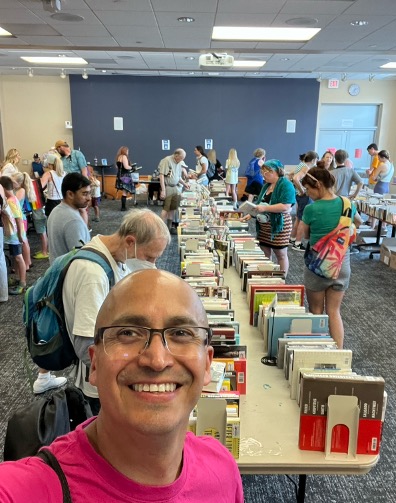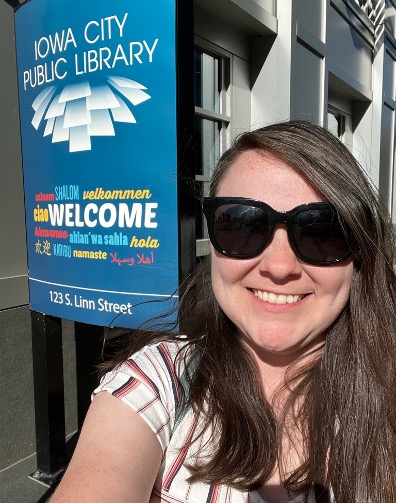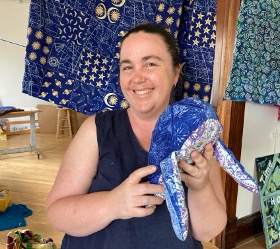
At some point, every student pursuing a graduate degree in the humanities has been asked, “So you're going to be a professor?” Humanities PhDs and MAs are often seen as hyperspecialized degrees useful only in the realm of academia—but in fact, the analytical and communication skills, as well as the broad understanding of culture attained through high-level study of the humanities, sets students up for success in a variety of careers, especially in the nonprofit sector. As globalization and rapid technological advancements are transforming the job market and accelerating the pace of change, it’s essential that graduate students be prepared to apply their skills in unexpected ways. University faculty, however, are not typically trained to guide these students toward meaningful, productive careers outside of academia.
This summer, the Obermann Center began addressing this need by facilitating a faculty externship program that placed nine UI faculty members with strong connections to the humanities in externships with local nonprofits. The program was funded by a grant from Mellon Humanities Without Walls (HWW), a consortium of sixteen top research universities in the Midwest housed at the University of Illinois at Urbana-Champaign and led by Professor and Director of the UIUC Humanities Research Institute, Antoinette Burton.
For the past several years, HWW has funded initiatives promoting cross-institutional research and educating graduate students about diverse career opportunities; most recently, it has focused on expanding that training to faculty who teach and mentor graduate students, funding special initiatives at four consortium universities that ask PIs to design a unique approach to preparing interested faculty to weave preparation for diverse careers into their mentoring and graduate courses.
The University of Iowa's initiative, housed at the Obermann Center for Advanced Studies, was led by Professor Ken Brown (Tippie College of Business), Professor Rachel Young (CLAS), and Obermann Director Teresa Mangum and Associate Director Lauren Cox, who consulted widely with faculty and potential employers in Iowa City and Cedar Rapids to design a unique externship program in which faculty undertook short-term professional learning experiences at local nonprofits.

The goals of the Obermann HWW Faculty Externship on Graduate Career Diversity were three-fold: to train faculty externs on how humanities methods, mindsets, and topics might align with the needs of non-academic employers; to provide nonprofit mentors with a deeper understanding of what humanities graduates can offer as future employees; and to help faculty support graduate humanities students who wish to prepare for non-academic careers. Leaders at three participating nonprofits—Public Space One, Neighborhood Centers of Johnson County, and the Iowa City Public Library Friends Foundation—met with the faculty externs, included them in board meetings, and involved them in events such as Public Space One’s art social and the ICPL Friends Foundation’s book sale. During interviews with faculty externs, nonprofit leaders discussed the challenges of competing for funding and the need for new hires with excellent communication, fundraising, and grant-writing skills. “The externship program was a mutually enriching experience,” says Katie Roche, Development Director of the ICPL Friends Foundation. “Reframing the work that my organization does and that I do in the world, breaking it down to skillsets that someone entering the field might want to foster in their graduate work, helped me reframe our work on the most fundamental level.”
After completing their eight-week externships, faculty returned to campus with an increased understanding of the diverse career opportunities available to humanities graduate students. This semester, they’re sharing their discoveries with their departments and proposing initiatives to involve graduate students more deeply in the wider Iowa City community. The most important takeaway for Jose Fernandez, Assistant Professor of Latina/o/x Studies and an extern at the ICPL Friends Foundation, was “the importance for graduate students of getting involved with the local community [and] develop[ing] an identity as a community member outside the realm of academic programs.” After completing his externship, he recommended that faculty in his department develop coursework to foster interdisciplinary skills, such as grant-writing and fundraising, and advance graduate students’ knowledge of the nonprofit world, including business and human resources.

Katy Ambrose, Assistant Professor of Music, completed her externship at Public Space One. Her biggest revelation was a mindset shift about what “success” as a musician looks like. “My graduate school professors pushed me down one specific path, and I had been doing the same with my own graduate students, assuming that was why they came to Iowa to study with me,” she says. “Seeing the joy and passion of the artists and staff at Public Space One helped me to realize that I had not always been leaving room for my students’ ideas of success to intersect with my own.” Going forward, she plans to encourage her students to “look outside the university for opportunities to learn from artists,” and she’s developing an idea for a summer course that allows music students to shadow local festival organizers and workshop leaders.
They, along with fellow faculty externs Andy Owens (Cinematic Arts), Jiyeon Kang (Communication Studies), Roxanna Curto (Spanish and Portuguese, French, and Latin American Studies), Brady G’Sell (Anthropology and Gender, Women’s, and Sexuality Studies), Lina-Maria Murillo (History, GWSS), Diana Thow (Translation), and Christine Zabala-Eisshofer (Higher Education and Student Affairs) will continue to think with their colleagues about ways to demonstrate to students and employers the enormous value that graduate study in the humanities can add to the workplace.